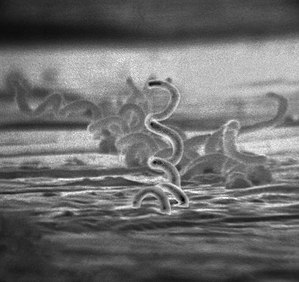Syphilologist
| Syphilis | |
|---|---|
 |
|
| Electron micrograph of Treponema pallidum | |
| Specialty | Infectious disease |
| Symptoms | Firm, painless, non-itchy skin ulcer |
| Causes | Treponema pallidum usually spread by sex |
| Diagnostic method | Blood tests |
| Similar conditions | Many other diseases |
| Prevention | Condoms, not having sex |
| Treatment | Antibiotics |
| Frequency | 45.4 million / 0.6% (2015) |
| Deaths | 107,000 (2015) |
| Classification |
· ·
|
|---|---|
| External resources |
Syphilis is a sexually transmitted infection caused by the bacterium Treponema pallidum subspecies pallidum. The signs and symptoms of syphilis vary depending in which of the four stages it presents (primary, secondary, latent, and tertiary). The primary stage classically presents with a single chancre (a firm, painless, non-itchy skin ulceration) but there may be multiple sores. In secondary syphilis a diffuse rash occurs, which frequently involves the palms of the hands and soles of the feet. There may also be sores in the mouth or vagina. In latent syphilis, which can last for years, there are few or no symptoms. In tertiary syphilis there are gummas (soft non-cancerous growths), neurological, or heart symptoms. Syphilis has been known as "the great imitator" as it may cause symptoms similar to many other diseases.
Syphilis is most commonly spread through sexual activity. It may also be transmitted from mother to baby during pregnancy or at birth, resulting in congenital syphilis. Other human diseases caused by related Treponema pallidum subspecies include yaws (subspecies pertenue), pinta (subspecies carateum), and bejel (subspecies endemicum). Diagnosis is usually made by using blood tests; the bacteria can also be detected using dark field microscopy. The Center for Disease Control recommends all pregnant women be tested.
The risk of sexual transmission of syphilis can be reduced by using a latex condom. Syphilis can be effectively treated with antibiotics. The preferred antibiotic for most cases is benzathine penicillin G injected into a muscle. In those who have a severe penicillin allergy, doxycycline or tetracycline may be used. In those with neurosyphilis, intravenous penicillin G potassium or ceftriaxone is recommended. During treatment people may develop fever, headache, and muscle pains, a reaction known as Jarisch-Herxheimer.
...
Wikipedia
